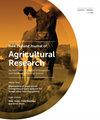肥料硫酸铵,磷酸二铵和尿素的氧化亚氮排放因子
IF 1.5
3区 农林科学
Q2 AGRICULTURE, MULTIDISCIPLINARY
New Zealand Journal of Agricultural Research
Pub Date : 2023-11-02
DOI:10.1080/00288233.2023.2277916
引用次数: 0
摘要
本研究测定了相同田间条件下,硫酸铵(as)、磷酸二铵(DAP)和尿素的氧化亚氮排放因子(EF1, N2O排放量占施氮量的百分比)。试验于2022年深秋和春季在新西兰的四个地点(怀卡托、马纳瓦图、坎特伯雷和奥塔哥)的牧场土壤上进行。4个试验点对尿素的平均EF1值在深秋为0.128% (95% ci、0.023%和0.249%),在春季为0.136% (95% ci、0.031%和0.259%)。AS在深秋和春季分别为0.125% (95% ci、- 0.021%和0.246%)和0.083% (95% ci、- 0.015%和0.197%),DAP在深秋分别为0.049% (95% ci、- 0.044%和0.157%)和0.090% (95% ci、-0.009%和0.205%)。尿素的平均EF1值为0.132% (95% c.i., 0.016%和0.269%),as为0.104% (95% c.i., - 0.008%和0.235%),DAP为0.069% (95% c.i., - 0.036和0.194)。3种肥料的EF1在个别地点或综合考虑4个地点均无显著差异(P > 0.05)。本文章由计算机程序翻译,如有差异,请以英文原文为准。
Nitrous oxide emission factors for fertiliser ammonium sulphate, diammonium phosphate, and urea
This study determined the nitrous oxide emission factors (EF1, the percentage of N2O emitted as a proportion of fertiliser N applied) for fertilisers ammonium sulphate (AS), diammonium phosphate (DAP), and urea under the same field conditions. Trials were conducted on pasture soils across four sites (Waikato, Manawatu, Canterbury and Otago) in New Zealand during late autumn and spring of 2022. The average EF1 values for urea across all four sites were 0.128% (95% C.I., 0.023% and 0.249%) in late autumn and 0.136% (95% C.I., 0.031% and 0.259%) in spring. The corresponding EF1 values for AS were 0.125% (95% C.I., – 0.021% and 0.246%) in late autumn and 0.083% (95% C.I., 0.015% and 0.197%) in spring, while for DAP, they were 0.049% (95% C.I., – 0.044% and 0.157%) in late autumn and 0.090% (95% C.I., -0.009% and 0.205%) in spring. The mean EF1 values across all four sites and two seasons were calculated as 0.132% (95% C.I., 0.016% and 0.269%) for urea, 0.104% (95% C.I., – 0.008% and 0.235%) for AS, and 0.069% (95% C.I., – 0.036 and 0.194) for DAP. No significant differences in EF1 were observed between the three fertilisers (P > 0.05) at individual sites or when considering all four sites collectively.
求助全文
通过发布文献求助,成功后即可免费获取论文全文。
去求助
来源期刊
CiteScore
4.90
自引率
16.70%
发文量
31
审稿时长
3 months
期刊介绍:
The New Zealand Journal of Agricultural Research publishes original research papers, review papers, short communications, book reviews, letters, and forum articles. We welcome submissions on all aspects of animal and pastoral science relevant to temperate and subtropical regions. The journal''s subject matter includes soil science, fertilisers, insect pests, plant pathology, weeds, forage crops, management systems, agricultural economics, agronomy, and animal science. The journal also accepts crossover papers on subjects such as land –water interactions.

 求助内容:
求助内容: 应助结果提醒方式:
应助结果提醒方式:


